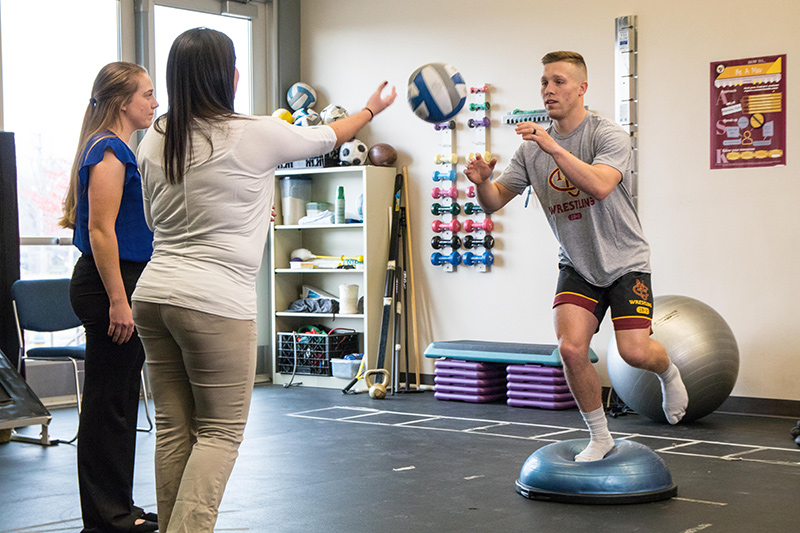The last Colorado Mesa University undergraduate class to major in athletic training received their diplomas in May 2019. It marked the end of the bachelor's program and the start of something new: the Master of Science in Athletic Training degree.
The announcement was made in 2016 after the National Athletic Training Association, Commission of Accreditation of Athletic Training Education as well as the Board of Certification voted that the athletic training degree had to exist at the master’s level by Fall 2022. CMU launched their program three years ahead of schedule.
“We chose to do it a little sooner than what the accreditors required,” said Department Head of Kinesiology and Athletic Training Program Director Jeremy Hawkins. The fear was if the program waited to transition students at the undergraduate level would struggle to find jobs. So they made the switch to protect students and started developing a new curriculum.
“We took a different approach than I think a lot of other programs did," said Hawkins. "We took a step back and said ‘okay what do we want an athletic training student to be able to do and how are we going to get there?’”
The program was condensed from over 50 credit hours to 38, as graduate programs typically require more time out of class and in the field. Hawkins said they also changed the order in which certain topics are taught. In the past, the program covered the lower extremities and how to treat injury in the fall, then in the spring students learned about upper extremities and how to rehabilitate. The graduate program is different in that students start off learning the most common injuries student-athletes run into so they can identify, treat and rehab individuals just weeks into the program.
“Right away we start with the ankle and we go through the rehab process and the treatment process, so four weeks in a student should feel fairly confident that no matter what ankle sprain they are looking at they can work with that athlete and diagnose the injury and treat it,” said Hawkins.
One of the most interesting things about the new graduate program is the immersion experience. Hawkins and his team are working to identify an array of preceptors all over the country that will allow students to get the exposure that best suits them and their future goals. For the first year, students will spend 20-25 hours a week in a clinical assignment. During the second year, they’ll be working the hours of an athletic trainer, which ranges from 30-50 hours a week.
“We will have students off campus their entire second year so all the classes will be online/hybrid,” said Hawkins.
For example, if a student wanted to work with Olympic athletes, they essentially could go to an Olympic athletic training center and learn from a preceptor there while still completing their degree at CMU.
The program is working towards its accreditation and is currently in the process of completing the application which will be filed in July 2020.They are expected to be fully accreted by the time their first cohort graduates in May 2021.
Accreditation Information
CMU is currently seeking accreditation for their new professional Athletic Training program and is not accredited by the Commission on Accreditation of Athletic Training Education (CAATE). The institution will be submitting a self-study to begin the accreditation process on July 1, 2020. Submission of the self-study and completion of a site visit does not guarantee that the program will become accredited. Students that graduate from the program prior to accreditation will not be eligible to sit for the credentialing examination for athletic trainers and will not be eligible for licensure in most states.
- CMU will submit the self-study for accreditation by July 1, 2020.
- CMU anticipates an on-campus site-visit by February 15, 2021.
- CMU anticipates notification of accreditation decision during late spring 2021.
- Students are not eligible for the BOC, Inc. examination until the program receives official notification of positive accreditation action.
